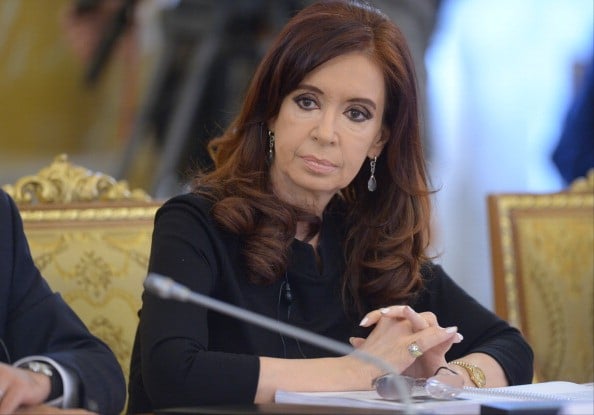What is Cristina Fernández de Kirchner’s Net Worth?
Cristina Kirchner is an Argentinian politician who has a net worth of $115 million. Christina Fernández de Kirchner is a lawyer and politician who served as the President of Argentina from 2007 to 2015, and earlier was the First Lady to President Néstor Kirchner. During her two terms as President, Kirchner was embroiled in several corruption scandals, and after her tenure was charged with fraud, obstruction of justice, and treason. In 2019 she became the Vice President of Argentina.
Kirchner Wealth Details
When Nestor Kirchner first came to power in 2003, he and Cristina reported a total net worth of $3 million. By 2009 their combined net worth had increased to $14 million. According to their 2009 financial disclosure they owned 28 properties valued at $4 million USD and bank deposits of $8 million. By 2013, after Nestor’s death, Cristina reported a personal net worth of $82 million. The couple has been accused of buying land at rock-bottom prices and building a series of hotels and tourism complexes using their political power. One of their hotels, the Hotesur in El Calafate, has been investigated for failing to pay taxes. Cristina has been accused of operating “ghost hotels” used to launder money. No official wrongdoing has ever been discovered by investigators.
Early Life and Education
Cristina Fernández de Kirchner was born on February 19, 1953 in La Plata, Argentina to single mother Ofelia, a Peronist union leader. Her father was Eduardo, a bus driver and anti-Peronist who married Ofelia when Kirchner was two. As an adolescent, Kirchner went to Popular Mercantil and Misericordia schools. She went on to attend the National University of La Plata, where she first studied psychology before switching to law. It was in college where Kirchner met her future husband Néstor, who helped foster her political interests. Soon, she was getting into Peronism and leftwing beliefs.
Career Beginnings
After graduating from college, Kirchner married Néstor and moved with him to Patagonia. There, she started her career in the provincial legislature, registering at the Tribunal Superior de Justicia of Santa Cruz in 1980. Kirchner later worked as an attorney for the Justicialist Party, and after that joined the Comodoro Rivadavia’s chamber of appeals. Additionally, she joined her husband’s law firm.
In 1989, Kirchner was elected deputy of the provincial legislature of Santa Cruz Province. Her husband became the governor a couple years later. In 1995, Kirchner was elected national senator, and went on to have a controversial tenure that resulted in her being removed from Congress in 1997. She subsequently ran for national deputy in the midterms, and later, in 2001, ran for senator. When her husband was elected President of Argentina in 2003, Kirchner became the First Lady.
Getty Images
President of Argentina
With her husband choosing not to run for reelection in 2007, Kirchner became the candidate for the Front for Victory alliance and won the presidency. She took over a country facing numerous challenges, including inflation, poor energy infrastructure and public security, and protests from the agricultural industry. Despite her low approval rating during her first term, Kirchner ran again in 2011 a year after the passing of her husband, who had been highly influential during her presidency. She ended up winning reelection with the highest percentage of any Argentine presidential candidate since 1983.
As President, Kirchner had a fairly turbulent two terms. Early on, she clashed with the agricultural sector, proposed a taxation system that was rejected, and fired the president of the Central Bank. Because the cost of public services remained subsidized, she renationalized the energy firm YPF. Kirchner also sought to carry on the work of her husband by overseeing a variety of human rights policies, including the continued trials of military personnel involved in the Dirty War. During her second term, she established currency controls, which led to the country’s fall into sovereign default in 2014. Kirchner left office the following year.
Corruption Scandals and Legal Charges
Kirchner’s presidency was marked by a number of corruption scandals related to money laundering, extortion, and corporate harassment, among other acts of malfeasance. Kirchner went on to face many charges after leaving the presidency, including for fraudulent low price sales of dollar futures, for which she was later acquitted. In late 2017, Kirchner was indicted for treason, but as a sitting senator at the time had immunity from prosecution. The following year, she received another indictment, this time for obstructing the investigation of the 1994 AMIA terrorist attack. Among her other charges, Kirchner was indicted for corruption relating to accusations that her administration had accepted bribes in exchange for public works contracts.
Vice President of Argentina
Despite all her corruption scandals, Kirchner was elected Vice President of Argentina in 2019 when her running mate Alberto Fernández became the new president. She subsequently resigned from the Senate. In September of 2022, Kirchner was the target of an assassination attempt when a man tried to shoot her in the face; ultimately, his weapon failed to fire and he was arrested.
Personal Life
With her husband Néstor, Kirchner had two children named Máximo and Florencia. In October of 2010, Néstor died from a heart attack.
In her other activities, Kirchner founded a think tank called the Patria Institute. She also penned a book entitled “Sinceramente,” which was released in 2019.

